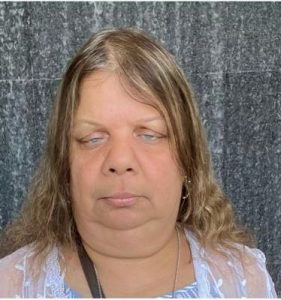
“Watching children grow up is so rewarding”– Sameena Karim
At BAME Vision, we are celebrating Blind and Partially Sighted parents from ethnic minorities, with the aim of contributing to the diverse representation of the vision impaired community. In this series, we are looking to shine a light on parents who work and volunteer, as we find out more about this largely unreported part of society. We will discuss parenting, culture, mental health, support systems, self-confidence, and everything else in between.
We had the pleasure of speaking with Sameena Karim. She is blind and a mother to two children and also has three grandchildren. Sameena is from a Pakistani ethnic background and has Glaucoma an eye condition.
How would you describe yourself?
My name is Sameena Karim. I’m a British/Pakistani who was born in England and both my parents were Pakistani.
I have a condition called Glaucoma, which is pressure in the eye. I lost my sight when I was just 14, and I went totally blind. It was the wrong time to lose your eyesight. I was a very quiet individual before losing my eyesight and then I became very rebellious. Well not rebellion necessarily, but you know, just trying to figure out what’s happening. But now, I’ve accepted it. I am still bubbly and enjoy going out to meet people, socialising but also enjoy being a grandmother.
So, culturally, do you feel that people expect something different from you as a vision impaired grandmother?
Yes, I feel that some people are culturally always saying, how is she going to cope? Should we really let her take our child out? Then they remember that I looked after their husbands when they were young. Once I’ve explained that to them, then they trust me to look after their children when they go out in the evenings, or need to do something during the day. I have two boys, also I stay with the children alone and both are under the age of three, I have another grand-daughter who is four and a half who I looked after for a long period of time, she has started school now. During lock down when she was around 12 to 14 months, I used to call her every day at 3 o’clock, and we would sing nursery rhymes and play peek-a-boo even though I cannot see what is on the camera. My son used to ask why we just sit on the phone while ‘Dada’ is singing {she laughs}.
What is your favourite blind mum hack, and do you still use it now as a grand mother?
When my children were younger and I used to worry about them picking things from the floor, and putting it in their mouth so I decided to buy a play pen. The trick for me is to keep everything in one place, that would be the one place for the children to play. They would play in the play pen, or one would be in there and the other one would be colouring. My youngest child is visually impaired so I was a bit worried about him because I wasn’t sure how much sight he had.
So now, I tell my son that we can’t have toys everywhere, in case I’m walking and carrying one of the babies. It doesn’t matter if there are a few toys around, I thought to have the whole room as a play pen but to have the whole room as a play pen might be a bit difficult. So what we’ve done is made a section for the children and put a big 8ft by 8ft play mat, where they have a little play kitchen set up, a little box they made into a Mosque at the top, a play house and all their toys! We have put their books in boxes so everything is organised. This does get mixed up sometimes, but we love spending time together sorting everything into the right boxes. The little one whose 18 months will put things in and take it out, but we just let him do it because that’s what he loves to do! The three year old gets upset about this sometimes, but I tell her “It doesn’t matter, we will just put it how it’s supposed to be after”. Their mum sits with us too, and helps organise things so we don’t need to and the ones that still work and so on, we all do it together. Being organised is very important, especially when you’re visually impaired. The other thing I do is I slide my feet. I don’t pick them up in case I step on anything.
We also have books from Clear Vision that have different sounds, textures and print on one side and braille on the other. The RNIB also have tactile books.
Do you have a Mother’s Day tradition, and do you carry on now as a grandmother?
My children still buy me flowers on Mother’s Day, and not just for me as their mother but to thank me for looking after their children, my grandchildren. For us, Mother’s day is everyday, so we don’t really go overboard celebrating, but they do get me flowers and chocolates.
What would you like to say to other blind grandmothers from ethnic minorities out there, and what would your advice be?
I advised my friend, and now she looks after her grandchildren. Grandmas should remind their family that they have looked after their own children, you brought them up, nobody else, so if you can bring your own children up, you can look after any child. You can also babysit for them. I do everything, from getting them dressed, to changing their nappies. If I can do it, you can too. There are things you can buy, like the bibs that have a pocket on them to collect any mess which you can empty out into the bin. You can put a mat underneath the highchair so the carpet doesn’t get dirty, also using syringes when they need to take medicine as it measures out the exact dosage, which some have different sizes.
My advice is, don’t be afraid just do it. If you want to look after your grand-children you can. If you want to look after your grandchildren and you feel like your children aren’t allowing you, just remind them “Who brought you up?”
Sometimes you find that their partners, wives or husbands aren’t too sure if you’re able to look after children because they don’t know, they’ve never seen you do it. I had to explain to mine that I used to take them to school, and she thought it might be different, because my children were used to me being blind [and knew how to navigate] that my grand daughter might run off. I reassured her that I would use the reins I had from when my boys were little. It’s a case of communicating with the children “Remember dada’s eyes don’t work” and the parents.
What do you like most about being a grandmother who is also vision impaired?
I love it. I love music, I get to listen to all the nursery rhymes, sing along with them as I love singing, I love watching them grow up and develop into these little people. It is so rewarding, especially the way the conversation suddenly develops between 2 and 3 year olds, the youngest one could be crying but stops in the middle to shout “Cha Cha slide!” [she laughs]
I just find it fascinating how we go form being little babies to adults, it is really so rewarding raising children. It keeps me active, keeps my brain occupied. One thing we love doing is asking my grand-daughter to describe to me what picture is in the storybook, then we make up a story based on the picture because I can’t read print. We also put bits of play-doh on my grand daughter’s nails and pretend it’s nail varnish.
Do you have any hobbies, passions and interests?
My hobbies are to do role play with the children. I put on little puppet shows for them, I use my drama skills to play fun games with the children. Sometimes I will call my older grand child and get her to play hide and seek with us, helping me find the ones who hide.
Be sure to tune in for part two, where Sameena will be joining us to discuss more about her hobbies and work, challenges she has faced, and services she has accessed to support her.
Written by Sylvia Chengo – BAME Vision
